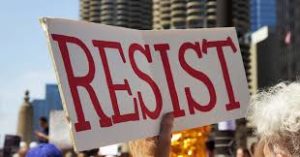What Can You Do
Despite my being a supporter of marriage equality, it is vitally important in the long run for there to be resistance to it. I would say that for any social change issue, we need to rethink our tolerance for resistance, because it is in the resistance itself that real change happens.
A number of years ago I was living in Queensland when Pauline Hanson made her famous debut on the political stage. It was a remarkable time to be there. I remember how friends, almost overnight, started to express what was to me the most vile racism. I was shocked by not only what was said but the fact that people I knew, really good people, were all of a sudden speaking in such fearful and hurtful ways
 What Pauline Hanson did was dredge up and fuel dormant racism. She exposed a part of Australia’s social consciousness and collective karmic psyche that was to me repulsive. Despite my judgements of it at the time, the fact of the matter is that it was there and it needed to be dealt with.
What Pauline Hanson did was dredge up and fuel dormant racism. She exposed a part of Australia’s social consciousness and collective karmic psyche that was to me repulsive. Despite my judgements of it at the time, the fact of the matter is that it was there and it needed to be dealt with.
Of course along with bringing to the surface this previously unacknowledged fear within the society, it also brought to the surface those people and ideas that were pursuing the opposite. I remember 40,000 people showing up for a Reconciliation March in Brisbane, an attendance and purpose that would have been unimaginable only a couple of years earlier. It was an exciting time in Australia actually, because there was such an increase in civic activity, social consciousness and the dissolving of outdated views.
Change Agents
Social change requires both the dark and the light.
Despite the discomfort at the time, and the pain that was caused to people through her words and the communities actions, it was all necessary for the social change process. In the end Pauline Hanson lost nor did her party survive. On the contrary, Australia was able to face up to the darker aspects of its culture. In looking back on it now though, it was necessary. And to perhaps go one step further (or at risk too far), Pauline Hanson was an important figure in Australian changemaking.
A more recent issue that has divided views is that of marriage equality. The last four years have been incredible in terms of the amount of legislation change that has affected people who identify as same sex attracted. The Government has changed a lot of laws affecting this part of the community, yet a lot of it went unrecognized by the mainstream media or society.
It has been the issue of marriage that has evoked such fierce resistance. There are a bunch of reasons for this including political, personal and religious, but that is not my focus here. What I do suggest is that this resistance is the most crucial aspect in this change journey. If same-sex marriage was legislated without resistance, homophobia could potentially lay dormant, unexamined and potentially grow further.
You cannot bring darkness into a lighted room, but bring light into darkness and the darkness will no longer exist. So if resistance is important, how do we deal with it?
What Do Others Think
I wrote a piece on the Gacaca process and how forgiveness went viral in Rwanda. This process has been a classic example of how a community can have the courage to face up to the darker aspects of its culture or history, without it needing to be a battle between light and dark. One of the beautiful things that Gacaca recognizes is that the real change is not about righting wrongs, but about rewriting stories.
The genocide in Rwanda was not simply a 100-day event in 1994. This cultural story of difference and misuse of power was embedded deep in the psyche of that country since the colonial powers divided the country by ethnicity in the 19th century. Many attempts had been made to correct these karmic wounds over that time, but none of them worked. This was because they denied the significance of facing the internal dimensions of the problems. Real change required the courage and compassion to face the deep cultural wounds
So what can Australia or other nations learn from Rwanda?Most importantly, we need to recognize that change operates on many levels, the least of which being legislative. Many of the ‘outer’ or tangible challenges we witness are driven by unresolved and unexamined cultural, karmic and outdated thinking.
Change must be both internal and external. I would suggest that without the internal change (personal beliefs and cultural stories), external change will never work or be sustainable. On the other hand, if you change the internal, this cannot help but flow through to external change. As above, so below.
My Best Ideas
As changemakers, we need to be able to stand in the face of resistance with compassion and courage. It is how the forces of light and dark meet that will actually create the change.
So to resistance, I say bring it on!
